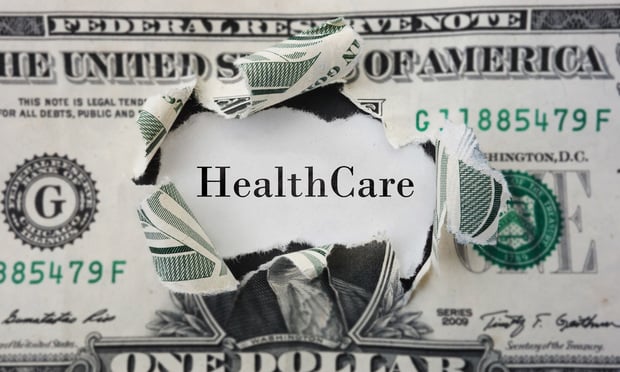(Bloomberg) -- If Republicans get their way at the Supreme Courtthis month and wipe out Obamacare premium subsidies for millions ofAmericans, the ensuing damage to their party in 2016 swing statescould be poignant.
|A state-by-state analysis by the Kaiser Family Foundation foundthat about 6.4 million Americans in 34 states that use the federalmarketplace would lose a total of $1.7 billion monthly tax creditdollars — an average of $272 per person — and face a net premiumincrease of 287 percent.
|The effects would be particularly perilous in swing states,according to the Kaiser report.
|READ: Which states will suffer most from subsidiescase?
|In battleground Florida — home of presidential candidate SenatorMarco Rubio and likely candidate Jeb Bush, as well as an openSenate seat in 2016 — 1.3 million residents would lose an averageof $294 per month in health insurance tax credits and face aremarkable 359 percent premium hike.
|In Wisconsin — home of Governor Scott Walker, a probablepresidential candidate, and politically vulnerable Senator RonJohnson — 166,000 residents would lose an average of $315 inmonthly tax credits and face a 252 percent premium increase.
|READ: 9.4 million fewer Americans can't pay medicalbills
|In Ohio, a critical presidential swing state and one whereSenator Rob Portman faces reelection, 161,000 people would lose amonthly average of $255 in premium tax credits and face a 190percent premium hike.
|In Iowa, a closely-watched state as the first presidentialnominating contest, some 34,000 people would lose $263 in monthlytax credits and face a 244 percent premium hike.
||In New Hampshire, another early primary state where SenatorKelly Ayotte is up for reelection, about 30,000 would lose amonthly average of $264 in tax credits and soak up a 218 percentpremium hike.
|READ: Next PPACA fight: who gets theblame?
|In Pennsylvania — a state that Republicans have unsuccessfullytried to put in play for a generation, where Senator Pat Toomeyfaces a reelection fight — nearly 349,000 residents would lose amonthly average of $227 in premium tax credits and swallow a 177percent premium hike.
|In Indiana, which went blue in 2008 and back to red in 2012,nearly 160,000 people would lose an average of $320 in monthly taxcredits and face a 271 percent premium hike.
|In North Carolina, which also flipped from blue in 2008 to redin 2012, more than 458,000 residents would lose a monthly averageof $316 in tax credits and face a 336 percent premium hike.
|Meanwhile, Obamacare beneficiaries in states like California andNew York, which set up their own exchanges, would be untouched bythe ruling.
|Congressional response?
|So far, congressional Republicans have notcoalesced around a contingency plan as competingfactions of the party are divided on what to do if the justicesagree that the subsidies are restricted to people buying on stateexchanges.
||"We could be looking at a moment of chaos," Johnson toldBloomberg last month. He has offered a bill to continue thesubsidies through August 2017.
|Republicans like Johnson worry that failing to respond would armDemocrats in 2016 with horror stories of people who lost theirhealth coverage and bring about attack ads claiming Republicanstook it away from them. Tuesday in Orlando, Walker said Congressmust act if the subsidies are erased: "States didn't create thisproblem, the federal government did. And they should fix it."
|House Majority Leader Kevin McCarthy of California said thisweek Republicans won't release their response legislation before ofthe Court's ruling, which is expected this month. Party leaders hadwanted a contingency plan in place ahead of time.
|On Tuesday, Wyoming Senator John Barrasso, the fourth- rankingSenate Republican, met with House Republicans to emphasize that theparty needs to be ready to respond quickly with a plan if thesubsidies are erased, his aide said.
|But, the Barrasso aide added, he did not say Republicans wouldrelease a plan prior to the ruling in the case, called King v.Burwell. It's unclear how the justices will rule.
|Copyright 2018 Bloomberg. All rightsreserved. This material may not be published, broadcast, rewritten,or redistributed.
Complete your profile to continue reading and get FREE access to BenefitsPRO, part of your ALM digital membership.
Your access to unlimited BenefitsPRO content isn’t changing.
Once you are an ALM digital member, you’ll receive:
- Critical BenefitsPRO information including cutting edge post-reform success strategies, access to educational webcasts and videos, resources from industry leaders, and informative Newsletters.
- Exclusive discounts on ALM, BenefitsPRO magazine and BenefitsPRO.com events
- Access to other award-winning ALM websites including ThinkAdvisor.com and Law.com
Already have an account? Sign In
© 2024 ALM Global, LLC, All Rights Reserved. Request academic re-use from www.copyright.com. All other uses, submit a request to [email protected]. For more information visit Asset & Logo Licensing.








